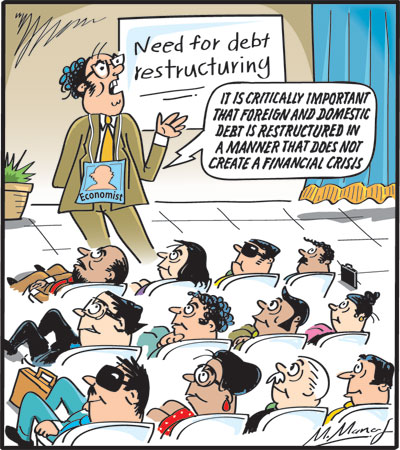Columns
The daunting challenge of restructuring foreign and domestic debt
View(s):The restructuring of the country’s foreign and domestic debt is critical for the nation’s economic recovery. The reduction of the foreign debt by US$ 17 billion by the end of September is a condition for the IMF’s Extended Finance Facility (EFF). This is a serious challenge.
Domestic debt
Some are of the view that foreign debt restructuring is similar to restructuring domestic debt. The restructuring of the domestic debt too is fraught with serious difficulties. It must be done in a manner that does not destabilise the financial market.
Problem of domestic debt restructuring
The problem with the domestic restructuring of debt is that it could create instability in the country’s financial market. This must be avoided.
Debt restructuring
Restructuring of debt is through maturity extensions, coupon cuts and haircuts on principal. They can come in combination or separately. Maturity extensions mean the extension of the debt repayment timeline. For example, a bond that is due in two years becomes one due in eight years.
Coupon cuts are when the interest paid (the coupon) is reduced. Haircuts on principal are when the face value of the debt is reduced.
Foreign debt restructuring
On the foreign debt side, the International Sovereign Bond (ISB) holders could negotiate hard and press for a sharper domestic debt restructuring so that what is required from them is less.
Q&A
The Q&A on debt restructuring released by the Treasury said the domestic debt optimisation operation is (notably) aiming to reduce the efforts that will be asked from foreign currency creditors by alleviating the short- and medium-term constraints faced by the government.
China
The other critical issue is China, as they are likely to avoid a Principal Haircut, and might not easily agree on the terms.
Difficulties
Getting over this hurdle will be a difficult negotiation. Overall, this could end up as a very difficult challenge. What if it fails? Do the creditors and the IMF have an alternate strategy? An innovative diplomatic strategy is imperative.
Domestic debt
Domestic debt restructuring is called domestic debt optimisation. It is supposed to be voluntary with no coercion, but given the regulatory power the government has on key entities that hold Treasury Bonds, it is unlikely to be that voluntary.
Treasury bills
For the Treasury Bills only those held by the Central Bank (which dominates the holdings of Treasury bills), are expected to be restructured. In terms of Treasury Bonds the very large holders are the EPF and the Banks and after that at a much lower level other institutions like Insurance companies, and individuals.
EPF and ETF
If the Employment Provident Fund (EPF) and the Employees Trust Fund (ETF) holdings are restructured and this is perceived to have negative consequences, how will the public react to this? If the banking-sector-held bonds are restructured what would happen to the health of the banking sector?
There could be regulatory forbearance but with the bank capital base being eroded, we could find banks needing to raise capital.
Other concerns
Another concern that is likely after the bonds restructure is how long would it take for the Treasury Bond market to be a feasible means for government financing.
Other countries
The experience of other countries has been that investors avoid investing in bonds for a period. That would mean the Treasury Bills would be the key option available for financing.
Recapitulation
All things considered, the restructuring of foreign and domestic debt is a daunting task. It is mandatory for the nation’s economic recovery. The reduction of the foreign debt by US$ 17 billion by the end of September — a condition for the IMF’s Extended Finance Facility (EFF) — is a serious challenge. On the other hand, the restructuring of the domestic debt, too, is fraught with serious difficulties.
The problem with the domestic restructuring of debt is that it could create instability in the country’s financial market.
Conclusion
In as much as debt restructuring is critically important, achieving it is fraught with considerable difficulties. The assistance of friendly countries is vitally important. Has the government worked out a diplomatic means of overcoming the inherent obstacles?
Buying or selling electronics has never been easier with the help of Hitad.lk! We, at Hitad.lk, hear your needs and endeavour to provide you with the perfect listings of electronics; because we have listings for nearly anything! Search for your favourite electronic items for sale on Hitad.lk today!


Leave a Reply
Post Comment